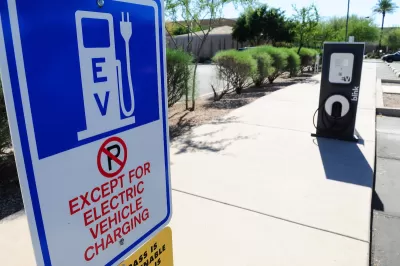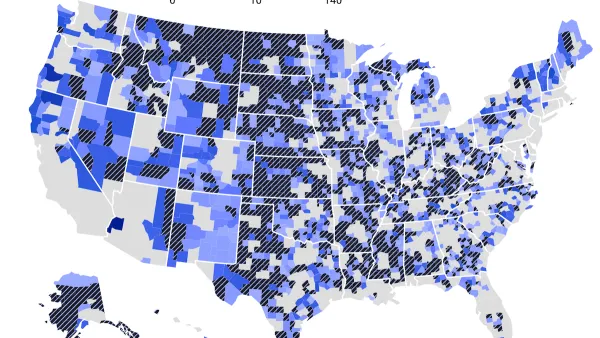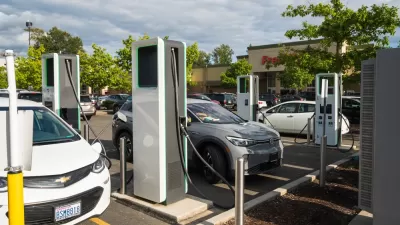A lack of access to charging infrastructure is holding back EV adoption in many US cities.

Writing in PC Mag, Emily Dreibelbis, highlights a paradox: while many electric vehicles are designed for urban environments, “Early adopters are primarily wealthy, single-family homeowners who can power up on private chargers versus those in rental property garages.”
Dreibelbis points out that by 2030, 60 percent of EVs will be in suburbs and “92% of chargers nationwide will be in single-family homes, according to a June 2023 DOE report.” The latter statistic reveals a major reason why urban Americans are less likely to buy electric cars: a lack of charging infrastructure.
[F]or now, EVs are stuck in the suburbs thanks to public charging limitations and a car culture where bigger means better.
The lack of accessible EV chargers in urban areas means urban dwellers can’t benefit from their advantages in the very places they would be most efficient. “When it comes to charging in urban areas, Europe has a few tricks the US hasn't embraced yet, such as converting existing light poles to charging stations. They're BYOC (bring your own cord); drivers pull up and plug in with their own equipment.”
Until urban infrastructure catches up, the suburbs will play a key role in EV adoption, Dreibelbis writes. “They prove that when charging is easy and available, and the driver considers the vehicle affordable, people love EVs.”
FULL STORY: Why Electric Cars Are Built for Cities, But Only Booming in the Suburbs

Maui's Vacation Rental Debate Turns Ugly
Verbal attacks, misinformation campaigns and fistfights plague a high-stakes debate to convert thousands of vacation rentals into long-term housing.

Planetizen Federal Action Tracker
A weekly monitor of how Trump’s orders and actions are impacting planners and planning in America.

San Francisco Suspends Traffic Calming Amidst Record Deaths
Citing “a challenging fiscal landscape,” the city will cease the program on the heels of 42 traffic deaths, including 24 pedestrians.

Defunct Pittsburgh Power Plant to Become Residential Tower
A decommissioned steam heat plant will be redeveloped into almost 100 affordable housing units.

Trump Prompts Restructuring of Transportation Research Board in “Unprecedented Overreach”
The TRB has eliminated more than half of its committees including those focused on climate, equity, and cities.

Amtrak Rolls Out New Orleans to Alabama “Mardi Gras” Train
The new service will operate morning and evening departures between Mobile and New Orleans.
Urban Design for Planners 1: Software Tools
This six-course series explores essential urban design concepts using open source software and equips planners with the tools they need to participate fully in the urban design process.
Planning for Universal Design
Learn the tools for implementing Universal Design in planning regulations.
Heyer Gruel & Associates PA
JM Goldson LLC
Custer County Colorado
City of Camden Redevelopment Agency
City of Astoria
Transportation Research & Education Center (TREC) at Portland State University
Jefferson Parish Government
Camden Redevelopment Agency
City of Claremont





























